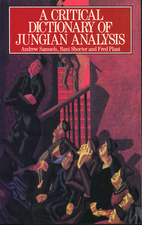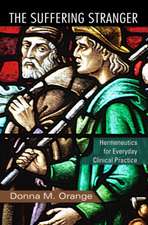Thinking for Clinicians: Philosophical Resources for Contemporary Psychoanalysis and the Humanistic Psychotherapies
Autor Donna M. Orangeen Limba Engleză Paperback – 24 iun 2009
Preț: 349.04 lei
Preț vechi: 367.42 lei
-5% Nou
Puncte Express: 524
Preț estimativ în valută:
66.79€ • 69.88$ • 55.48£
66.79€ • 69.88$ • 55.48£
Carte tipărită la comandă
Livrare economică 03-17 aprilie
Preluare comenzi: 021 569.72.76
Specificații
ISBN-13: 9780881634938
ISBN-10: 088163493X
Pagini: 168
Dimensiuni: 152 x 229 x 13 mm
Greutate: 0.25 kg
Ediția:1
Editura: Taylor & Francis
Colecția Routledge
Locul publicării:Oxford, United Kingdom
ISBN-10: 088163493X
Pagini: 168
Dimensiuni: 152 x 229 x 13 mm
Greutate: 0.25 kg
Ediția:1
Editura: Taylor & Francis
Colecția Routledge
Locul publicării:Oxford, United Kingdom
Public țintă
Postgraduate, Professional, and Professional Practice & DevelopmentCuprins
Introduction: Psychotherapy in a Socratic Spirit. Martin Buber: The Dialogic We. Ludwig Wittgenstein: Nothing is Hidden. Maurice Merleau-Ponty: Embodied Intersubjectivity. Emmanuel Levinas: Trauma in the Face of the Other. Hans-Georg Gadamer: Understanding the Situation with the Other. Afterword. Glossary
Notă biografică
Donna M. Orange, Ph.D., Psy.D., is faculty and supervising analyst at the Institute for the Psychoanalytic Study of Subjectivity, New York, and a training and supervising analyst at the Istituto di Specializzazione in Psicologia Psicoanalitica del Sé e Psicoanalisi Relazionale, Rome. She has authored and coauthored several books, including Emotional Understanding (1995) and Worlds of Experience (2002).
Recenzii
"This is an immensely thoughtful, clear and illuminating book that convincingly demonstrates the usefulness of philosophy for psychoanalysis and psychotherapy. It shows the hermeneutic sensibility shared by philosophy and psychotherapy and shows how the light shed by the former can transform the way we see the latter, and vice versa." - Simon Critchley, Ph.D., Professor and Chair of Philosophy, New School for Social Research
"For nearly two decades, philosopher-psychoanalyst Donna Orange has been in the vanguard of those psychoanalytic thinkers who contend that the health and growth of psychoanalysis and psychoanalytically-based psychotherapies depend on their being grounded in sound philosophical questioning. Thinking for Clinicians is the crowning achievement of her efforts so far, providing working clinicians with a wealth of philosophical ideas and tools for thinking about their therapeutic work and theories. In clear, clinician-friendly language, she brings her readers into conversation with five great philosophers—Buber, Wittgenstein, Merleau-Ponty, Levinas, and Gadamer—whose philosophies bear a particular relevance to contemporary therapeutic practice, which is becoming increasingly and self-consciously phenomenological, dialogical, and humanistic. Any clinician who reads this wonderful book will, of necessity, become much more thoughtful about his or her clinical work. I recommend this volume with the utmost enthusiasm to all students, trainees, and practitioners of our calling." - Robert D. Stolorow, Ph.D., author, Trauma and Human Existence (Routledge, 2007)
"Donna Orange is well known for her ability to translate philosophical ideas into clinically useful perspectives. In this book, her exquisitely clear renderings of the lives and ideas of some of her philosophical mentors allow us to see for ourselves, and even draw us into befriending thinkers with whom we might ordinarily feel intimidated. Although a psychoanalyst, Orange has gone out of her way to point to her alignment with humanistic therapeutic traditions. I am certain my gestalt colleagues, who are influenced already by Buber and Merleau-Ponty, and who embrace a dialogic therapeutic stance, will find Orange's explorations quite congenial and will benefit from reading her ideas." - Lynne Jacobs, Ph.D., Co-founder, the Pacific Gestalt Institute
"Thinking for Clinicians represents a turn in our field that is taking place - embedded in still larger turns in psychology, in the intellectual world, and in our culture as a whole - a turn toward a more profound humanism and deep reflection. Donna Orange is that rare combination of a true philosophical scholar and a deeply experienced psychoanalytic clinician, and her book definitively spans the rift separating psychoanalysis from philosophy since Freud. She shows us that our clinical work always embodies our philosophical commitments, and that our efficacy as analysts is powerfully enhanced by reflection on those commitments. I see her book as profoundly enriching contemporary thought about psychotherapy." - George Atwood, Ph.D., Professor of Psychology, Rutgers University
"Donna Orange, multilingual, multicultural, compassionate, is a good teacher whose love of philosophy and of helping imbue this valuable book...This book requires us to think more and better about what we are doing and feeling. It is a gift, small but weighty, really worth taking on the trip." - E. James Lieberman, M.D., Metapsychology Online
"For nearly two decades, philosopher-psychoanalyst Donna Orange has been in the vanguard of those psychoanalytic thinkers who contend that the health and growth of psychoanalysis and psychoanalytically-based psychotherapies depend on their being grounded in sound philosophical questioning. Thinking for Clinicians is the crowning achievement of her efforts so far, providing working clinicians with a wealth of philosophical ideas and tools for thinking about their therapeutic work and theories. In clear, clinician-friendly language, she brings her readers into conversation with five great philosophers—Buber, Wittgenstein, Merleau-Ponty, Levinas, and Gadamer—whose philosophies bear a particular relevance to contemporary therapeutic practice, which is becoming increasingly and self-consciously phenomenological, dialogical, and humanistic. Any clinician who reads this wonderful book will, of necessity, become much more thoughtful about his or her clinical work. I recommend this volume with the utmost enthusiasm to all students, trainees, and practitioners of our calling." - Robert D. Stolorow, Ph.D., author, Trauma and Human Existence (Routledge, 2007)
"Donna Orange is well known for her ability to translate philosophical ideas into clinically useful perspectives. In this book, her exquisitely clear renderings of the lives and ideas of some of her philosophical mentors allow us to see for ourselves, and even draw us into befriending thinkers with whom we might ordinarily feel intimidated. Although a psychoanalyst, Orange has gone out of her way to point to her alignment with humanistic therapeutic traditions. I am certain my gestalt colleagues, who are influenced already by Buber and Merleau-Ponty, and who embrace a dialogic therapeutic stance, will find Orange's explorations quite congenial and will benefit from reading her ideas." - Lynne Jacobs, Ph.D., Co-founder, the Pacific Gestalt Institute
"Thinking for Clinicians represents a turn in our field that is taking place - embedded in still larger turns in psychology, in the intellectual world, and in our culture as a whole - a turn toward a more profound humanism and deep reflection. Donna Orange is that rare combination of a true philosophical scholar and a deeply experienced psychoanalytic clinician, and her book definitively spans the rift separating psychoanalysis from philosophy since Freud. She shows us that our clinical work always embodies our philosophical commitments, and that our efficacy as analysts is powerfully enhanced by reflection on those commitments. I see her book as profoundly enriching contemporary thought about psychotherapy." - George Atwood, Ph.D., Professor of Psychology, Rutgers University
"Donna Orange, multilingual, multicultural, compassionate, is a good teacher whose love of philosophy and of helping imbue this valuable book...This book requires us to think more and better about what we are doing and feeling. It is a gift, small but weighty, really worth taking on the trip." - E. James Lieberman, M.D., Metapsychology Online
Descriere
Thinking for Clinicians provides analysts with the tools and context for working critically within psychoanalytic theory and practice through detailed chapters on some of the philsophers whose work is especially relevant for contemporary theory and clinical writing.













